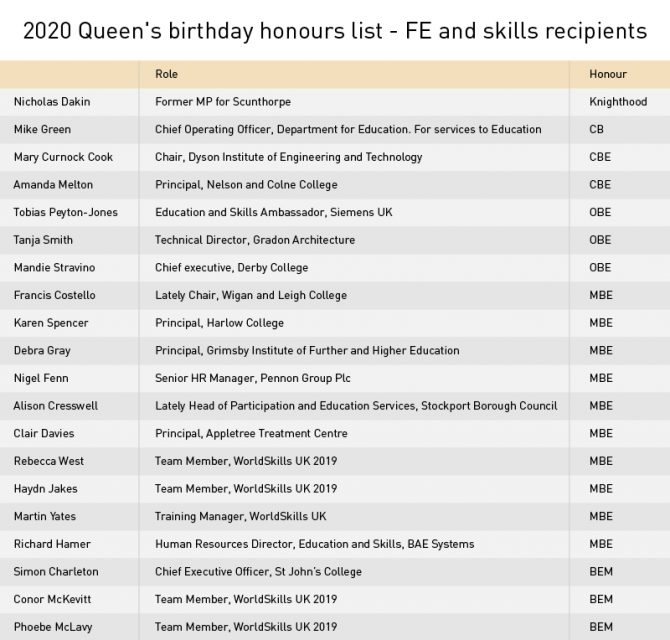The Department for Education has this morning published eight intervention reports based on FE Commissioner visits that in some cases took place more than a year ago.
These are the first reports to be published since Gillian Keegan (pictured) was appointed as minister in March 2020.
The reports were accompanied by a letter from Keegan, many of which were dated 15 July 2020.
FE Week reported on 7 July 2020 the FE Commissioner, Richard Atkins, wrote to college bosses on June 16 to inform them that his team has recommenced its work on a virtual basis, following a Covid-19 related pause.
Summary and links to the reports and letters below.
Gateshead College
Further light has been shed on the cause of Gateshead College’s shock £6 million deficit in its newly-released FE Commissioner report.
In a report based on visits last December and January, Atkins writes the underpinning cause of the shortfall was “a failure by the board and the senior leaders at the college to address the very significant reduction in income that was the result of the loss of the European Social Fund (ESF) contract”.
FE Week first reported last December that Gateshead’s governors had called in independent investigators to explain why the deficit had come about. The principal and chair of governors both left during the ensuing controversy.
Large short-term contracts like ESF had provided a “significant” financial contribution to the college’s bottom like, Atkins explained.
An otherwise “successful” ESF project concluded in January, but the senior leaders reported there were “no significant financial concerns” to the board, despite losing the ESF contract.
The commissioner found the college had in fact been in deficit for years, but this had been disguised by a misstatement of certain bills. Other factors behind the shortfall include “incorrect” budgeting of around 40 per cent for subcontracting costs, which was a “major” cause of the size of the deficit.
Keegan wrote that there had been “significant failures in leadership and governance have allowed for the serious deterioration of the college’s financial position”.
The college said that, since the visit, a structure and prospect appraisal has been completed and is awaiting sign off from ministers. One option being explored is a merger.
A spokesperson said: “Our focus remains on making sure that the good work to date continues and that we keep to the agreed targets in our recovery plan, including the appointment of a permanent principal, while delivering the very best education and training for our local community, strengthening financial health and maintaining the confidence of our stakeholders.”
Stoke-on-Trent College
The college received a £20 million taxpayer bailout two years ago and was warned it faced “significant challenges” following its FE Commissioner report, but said it is now on a “strong trajectory of improvement”.
Stoke-on-Trent narrowly avoided insolvency, according to the FE Commissioner’s assessment from March, and only escaped thanks to exceptional financial support between January 2016 and September 2017.
The college later received £21.9 million from the Department for Education’s restructuring facility in September 2018.
This all came after income declined by more than a third between 2004 and 2014, so commercial loans agreed at the start of that period were no longer affordable by the end.
Following the bailouts and redundancies for 5 per cent of its workforce, Stoke-on-Trent is now on track for ‘good’ financial health in the 2019-20 financial year.
A spokesperson said the college is “working well to progress the recommendations of the FE Commissioner, despite the disruption of Covid-19”.
However, Atkins has warned the Education and Skills Funding Agency would be writing to Stoke-on-Trent to refresh its financial health notice to improve following his visit.
An “urgent” investment in IT equipment was also recommended in the report, after students commented on its “poor” quality, and owing to the Covid-19 pandemic placing a much greater importance on online learning.
The college has said it has recruited for the vacant finance positions, and the curriculum job will be filled by the end of 2020, and made a “considerable” investment in its IT facilities since the commissioner’s visit.
Skills minister Gillian Keegan, in a letter accompanying the report, said while “significant challenges remain, the college has adopted a positive approach towards implementing various improvement initiatives to address both historic and recent concerns”.
RNN Group
This college group suffered “serious decline” in enrolments, quality and financial health following multiple mergers, the FE commissioner reported.
RNN Group was created from a merger of Rotherham College of Arts and Technology (RCAT), and North Nottinghamshire College in February 2016. In February 2017, there was another merger with Dearne Valley College, on the recommendation of the Sheffield City Region Area Review, which the commissioner was involved with.
However, Atkins has now identified that the mergers led to a decline in finance and Ofsted grades – for RCAT – from ‘good’ to ‘requires improvement’.
Income had fallen “steadily”, owing to fewer student enrolments. RNN part-financing its University Centre Rotherham had also “eroded” its reserves, while higher education student recruitment was down.
There was also a “steep” reduction in 16 to 18-year-old student numbers since the merger, though that has largely stabilised in 2019-20.
Mergers had also created what Atkins called a “substantial” college estate, stretching across south Yorkshire and north Nottinghamshire. He recommended a “rationalisation” of the estate and the college has since removed all provision from one of its sites, Dinnington. It is looking at renting or selling some or all of the buildings and land.
At the time of the commissioner’s assessment last December, RNN had subcontracted out adult education budget provision to 22 subcontractors, seven for apprenticeships, and four for 16 to 18 study programmes. This level, the commissioner wrote, presented a “risk” to RNN. The college said it now has just 11 subcontractors.
Atkins raised concerns about RNN’s governance during his assessment, including the lack of finance committee despite the “significant financial challenges”, and the seven vacancies for independent governors, leaving the board “severely depleted”.
Principal Jason Scott said “significant” progress has been made since then: “Strong governance is in place, and important progress has been made with financial recovery, quality improvement, rationalisation of surplus estate capacity and reduced staff costs.”
Hull College Group
FE Week was leaked a copy of Hull College’s FE Commissioner report in January and revealed how it would show that leaders employed “close family members” and created a culture where staff would not speak out for “fear of being exited at short notice”.
It came after this publication reported in December – a month after Atkins’ visit – that Hull’s chief executive, Michelle Swithenbank, and vice principal for HR, Julie Milad, had been suspended and then quit.
The commissioner’s report published last week includes the same findings, such as “clerking arrangements have not been sufficiently independent from the executive and have fallen below acceptable standards” and “many staff felt reluctant to voice their concerns to senior leaders because of a lack of trust”.
Keegan wrote that she it was “clear that the college leadership has experienced significant turbulence” and that she was “concerned with the weakness of governance arrangements on”.
Derek O’Toole took over as interim chief executive at Hull College at the end of 2019, and Atkins’ follow-up visit over the summer said he had “already made a positive impact”.
A spokesperson for Hull College said the college has “made rapid and effective progress against a report from a specific point in time nearly a year ago”.
“The college has not only completed all 11 recommendations detailed in the report at that time, but has focused on making many other improvements for our learners and staff to give the city a college it so richly deserves,” they added.
Birmingham Metropolitan College
BMet received a highly positive report from the FE Commissioner which skills minister Gillian Keegan said showed “remarkable improvements” since the group first entered formal intervention in 2015.
Principal Cliff Hall told FE Week, following the report’s publication, that they have met all of the commissioner’s recommendations “due to the hard work and dedication of staff”.
This marks a rare upturn for the college, which has received three consecutive ‘requires improvement’ ratings from Ofsted, and was said to be on the “brink of insolvency” as late as last August.
The commissioner reported the chair, school ‘superhead’ Sir Dexter Hutt, appointed in January 2019, is “confident and capable and has led a period of rapid and significant cultural change in partnership with the principal”.
Staff, the commissioner wrote, have a “greater level of confidence” in the future and are “complimentary” about Hall and his “clear, open and honest approach”.
In a letter attached to the report dated July this year, Keegan said the report “describes the college as having made remarkable improvements, and it was clear governors and leaders “have been working diligently and effectively to implement rigorous and focussed strategies for improvement”.
Atkins, who assessed BMet in October 2019, also praised the “timely manner” in which BMet responded to concerns from the community about the controversial removal of provision from its Stourbridge campus, as part of a structure and prospects appraisal (SPA) led by Atkins’ team.
Coventry College
A lack of “clear post-merger strategy” and “robust scrutiny” led to a “substantial deterioration of financial stability” for this college, which almost went insolvent this year.
Henley College Coventry and City College Coventry merged to become Coventry College in August 2017. City College had achieved three ‘requires improvement’ and two ‘inadequate’ ratings from full Ofsted inspections prior to merger.
The merged college was inspected for the first time in September 2019 and achieved a grade three.
Atkins visited in November 2019 and found that governors had allowed the college to “drift” since the merger without developing and directing a “clear post-merger strategy and harmonisation plan”.
“Whilst this work has gathered pace since January 2020, the financial and curriculum performance of the college has deteriorated, and its future is now challenging,” he added.
An “overly optimistic” merger plan was developed, which contained significant income growth that the college has not delivered. In 2019, the college finances “have suffered from weak financial controls, poor strategic financial leadership, and a lack of strong governance challenge”.
The report warns that Coventry College breached bank covenants during the year which made a £10 million loan with Barclays liable by 1 August 2020. Atkins said if the college was not able to reclassify the loan, it would go insolvent. The college confirmed to FE Week it was able to secure an extension on the loan.
Keegan’s letter said that following the formation of Coventry College in 2017, the “lack of a clear post-merger strategy or robust scrutiny have contributed to the substantial deterioration of financial stability and curriculum performance, to the point that the college now faces a challenging future”.
Atkins revisited Coventry in September 2020 and said the college’s newly appointed principal, Carol Thomas, has made an “immediate impact despite only being in post for a short time”.
A Coventry College spokesperson said: “In the intervening six months [since the commissioner’s original visit], the college has worked hard to address the specific recommendations and all of those which had a September or earlier deadline have now been completed.
“The FE Commissioner team has undertaken a ‘stocktake’ visit during September 2020 and has recognised the significant progress made against their original set of recommendations.
“The college’s financial accounts for 2019/20 will show a circa £1 million improvement on the figures shown in the March FEC report, as a result of the implementation of its recovery plan.”
Highbury College
There has been a “significant step-change in openness and trust” at the scandal-hit college where staff previously felt “undervalued” and “too scared to challenge”, the FE Commissioner’s report said.
Atkins visited Highbury College in October 2019 after FE Week revealed how its long-standing principal, Stella Mbubaegbu, had spent £150,000 on expenses in four years, which included one-off lavish items such as a £434 pair of designer headphones and a lobster dinner.
The commissioner found that governance and leadership were “seriously dysfunctional” namely because the relationship and trust between the chair, Tim Mason, and principal had “broken down”.
Mason admitted that the board had “not operated with sufficient scrutiny and challenge”.
Atkins said he found a number of “significant leadership and management” issues, including the “very high” turnover of new staff in their first year, low staff morale, and an “expressed lack of trust by staff in their leaders”.
Staff that filled out an Investors in People survey also reported that “people are too scared to challenge or feel nothing will come of it”.
Mbubaegbu, who joined in 2001 and officially retired in April 2020, actually left her position as accounting officer in December – a month before new interim principal Penny Wycherley and interim chair Martin Doel discovered Highbury was running out of cash and had to secure a £1.5 million emergency bailout, as previously reported by FE Week.
In Atkins’ follow-up visit over the summer he commended a new “positive culture across the college with managers more empowered and engaged, and staff now working well together”.
The report reads: “Effective leadership and communication from the interim principal/chief executive have improved staff morale and the culture of the college. The staff survey, and staff and trade union feedback, all reflect a significant step-change in openness and trust.”
Wycherley said: “Staff have shown real ‘blitz spirit’ throughout the pandemic and their passion and commitment for teaching has shone through.”
East Sussex College Group
The college was visited by Atkins’ team in December 2019 during which he found various reasons for its ‘inadequate’ financial health: unstable and poor leadership; a downward trend in 16 to 18 recruitment; £1.1 million government clawback relating to ineligible apprenticeship provision delivered by a former subcontractor at Sussex Coast College Hastings in 2011/12 and 2012/13; and inaccurate data reporting.
The college was also rapped for its “wholly inadequate” preparations for T Levels that were set for rollout in September 2020 but presented a “high risk of failure”, and concern over the “quantity of subcontracted activity”.
Keegan’s letter said the college’s governance and leadership arrangements were “weak and unsuited to the size and complexity of the college”.
“It is clear from the report that current management structures have failed to provide clear strategic direction for the college and have not adequately addressed ongoing and emerging issues following merger,” she added.
Atkins made a follow-up visit in July and said the college has made “progress despite the turbulent circumstances during which existing challenges, including financial ones, have been exacerbated by the Covid-19 pandemic”.
Commenting this week on the report, an East Sussex College Group said they feel that the college has made “significant progress in resolving the financial leadership concerns via the appointment of an experienced turnaround chief financial officer and new finance director.
“Alongside a review of our financial processes and controls we anticipate a steady improvement in financial health, even in a Covid affected climate, in 2020/21.”
They added that the college has “successfully launched our first three T Levels”, with 45 students engaging in the new qualifications, and have “reduced our reliance on subcontracted provision”.
The interim leadership team have been supported by national leaders in FE, and a new-look governing body is completing the recruitment process for a new chief executive this month.






